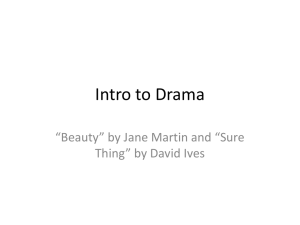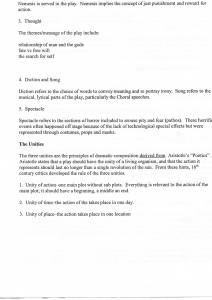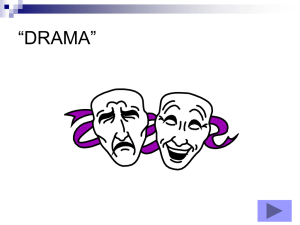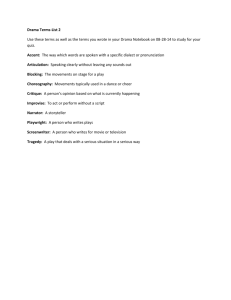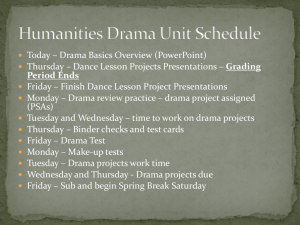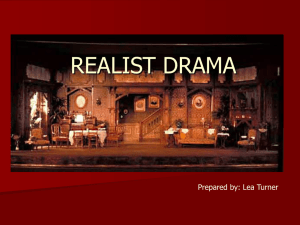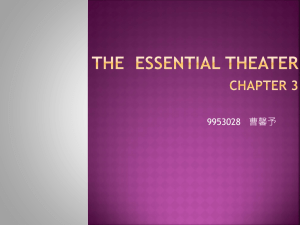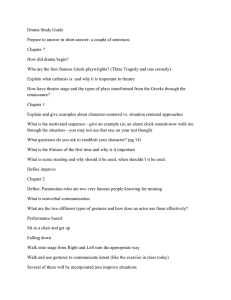Beauty
advertisement
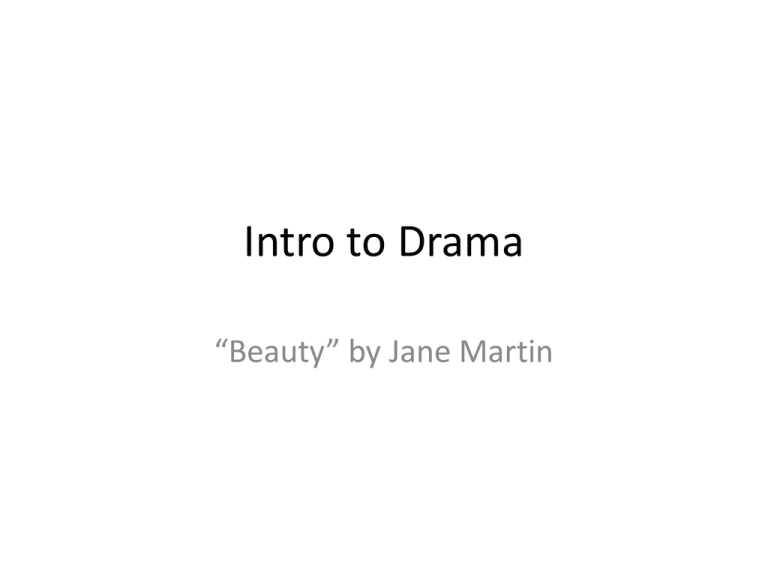
Intro to Drama “Beauty” by Jane Martin Think, Pair, Share • We are going to think about these questions silently for a moment, pair with a partner, and share your ideas with each other before we discuss them as a class. • How is reading drama different from reading fiction (like a short story or a novel)? What things are especially important to notice when reading drama? • That being said, how does watching a play differ from reading one? (You might want to think about a specific play you have both read and seen performed.) Elements of Drama • When reading a play, you will encounter two distinct types of writing that the play needs in order to get its action across to an audience. – The dialogue consists of the lines the actors speak as they perform their parts. – The stage directions, which are written in third person present tense, tell what the actors should be doing. They also give directions about sets, lighting, and music. They are usually written in italics. Some authors write sparse, simple stage directions, and some writers provide extensive, often beautifully eloquent stage directions. Elements of Drama, Continued • Drama, like fiction, has characters, setting, plot, etc., but there are some characteristics of drama that are unique because drama is meant to be performed live. – Sets (scenery, props, etc) may be elaborate or simple, and often reflect the theme of the play. • Playwright Anton Chekov once said, "If you put a gun over the mantle in the first act, then it must fire in the last." – Lighting and music are used to create mood and enhance theme. Aristotle’s Unities (and How to Break Them) • Neo-classical playwrights believe that Aristotle (who they held in high regard) had said that a play should observe three “unities:” – Unity of action: They thought a play should have one main plot and no subplots. – Unity of time: They thought that the events of a play should take place in the span of 24 hours, or, even better, that the action of the play should unfold in “real time.” – Unity of place: They thought that the stage should represent one place, and one place only. (So no scene changes.) How to Throw Aristotle’s Unities out the Window • Most modern drama does not observe these three unities. (And neither did Shakespeare.) • Action can take place in many different settings. A playwright can indicate to an audience that the setting has changed by a change in props or lighting, or by writing dialogue that mentions where the characters are. Some playwrights who have a large stage to work with assign different parts of the stage to different settings. • The important thing is, if a playwright chooses to switch from one setting to another, the audience should not be confused about where the new setting is. How to Throw Aristotle’s Unities out the Window • Many plays do not observe the “Unity of Time,” either. So, how do playwrights indicate that time has passed? • If enough time has passed in the story of the play, they call for the director of the play to cast different actors. • They include dialogue for their actors that indicates how much time has passed. • Subtle changes in lighting, props, costumes, and music can indicate a passage of time. How to Throw Aristotle’s Unities out the Window • Any time you see a scene or act change in a play, there is a good chance that the playwright just broke one of the unities. Be on the lookout for how much time has passed and whether or not the characters are in the same place they were before. In Class Reading of Beauty on p. 762 • At the bottom of p. 765, the two women switch bodies. So, for my two “actresses,” when the switch occurs… • The first name is the one you should be looking at to figure out who speaks based on your original roles that you chose. • The second is the character you're now playing. – Carla/Bethany = Bethany in Carla’s body (so Carla's actress still speaks, but she is now playing Bethany) – Bethany/Carla = Carla in Bethany’s body (so Bethany’s actress still speaks, but she is now playing Carla) Questions for Beauty • This seems on the surface to be a case of “The grass is always greener on the other side.” Is there anything else going on here? What other issues does this play bring up? How does the play address those issues? • Does this story unfold differently than it might have in a novel/short story because it's a play? How? • Why is the switch supernatural? Why don't they just talk about their differences? • Which woman do you think is going to be happier with the switch? Support your opinion.
